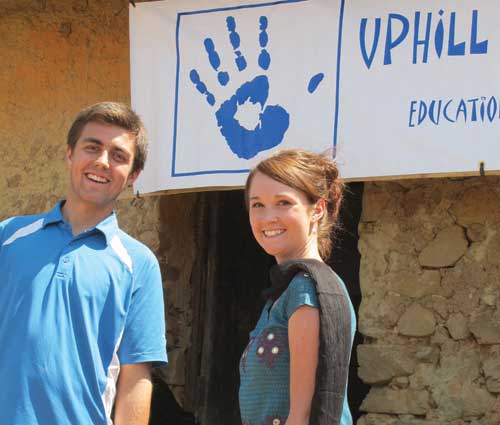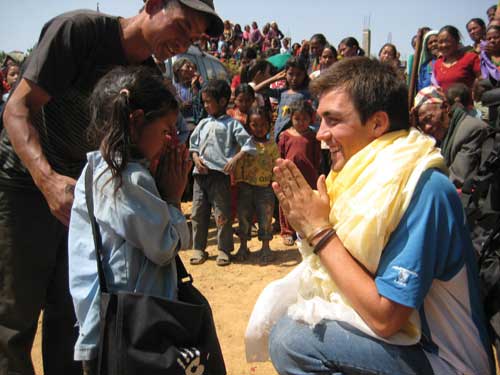Mountain roads in Nepal aren't really meant for vehicles. The narrow, winding and pothole-ridden paths that connect Nepal's remote villages to the outside world are precarious at best and can often be downright treacherous, looming dangerously above deep canyons without so much as a guardrail to prevent disastrous slips over the side.
If a vehicle going up one such road meets another coming down, someone has to go in reverse until the duo reaches a point in the road that's wide enough for one of them to pull over and let the other pass.

Uphill Both Ways Education and Relief Fund (the agency's official name) delivers educational and health-care supplies to impoverished communities in Nepal. The agency is the brainchild of Pritchard, who in 2005 saw first-hand just how far a few hundred Canadian dollars could go in a country where many people go without much of anything at all.
Pritchard was backpacking through Nepal after graduating high school, trekking with a group of cohorts through various mountain passes from one small village to another. Little did Pritchard know that what she saw in those villages, and what she ultimately decided to do about it, would change her life forever – as well as the lives of hundreds of Nepalese schoolchildren.
"Our guide had a connection to the school in one of the villages where we stayed," Pritchard recalls. "We asked if we could go in and take a look at it, and what we saw was absolutely heartbreaking."
Pritchard describes the schoolhouse she saw that day as a "dilapidated little shack." The one-room facility had a couple of rickety benches for older students to sit on, but younger children in the class were relegated to the floor. There were no books, no pencils, no materials of any kind except the remnants of a broken chalkboard, which remained unused because the school didn't have funds to buy chalk.

At the end of the trip the trekkers decided to chip in $20 each to buy supplies for the school. Between 10 of them they were able to fill the trunk of a taxicab with supplies, and pay wages for two men to haul everything they'd purchased into the remote village on foot.
For Pritchard, from that point on there was no looking back. When her younger sister made the same trip to Nepal after her own high school graduation, Pritchard teamed up with her to raise $4,700 that ultimately bought desks, benches and a load of supplies for another school in need. The snowball had starting rolling, and by 2009 Pritchard was itching to go back to Nepal to contribute in an even bigger way.
Enter Andrew Andreachuk, a classmate of Pritchard's who was ready to help take the project to the next level.
"I really wanted to get away somewhere for a while and do something completely different. When I started talking to Janelle about the things she was doing in Nepal, I knew I had to be a part of it," says Andreachuk.
Pritchard and Andreachuk began to lay the groundwork for their visit to Nepal months before they departed, organizing a variety of fundraisers and starting the wheels in motion to legally establish their agency as a not-for-profit organization in Canada. By the end of 2009, they'd raised more than $17,000 via a benefit concert, a silent auction, through the sale of handmade Nepalese scarves and hats, and through private donations.
Two university organizations, Rotaract and the U of L Climbing Club, lent momentum to the cause, planning and co-hosting the Everest Challenge – a weekend event where climbers took donations for scaling the height of Mount Everest over the course of two days.
Every penny that Uphill Both Ways receives goes directly into a bank account in Kathmandu and is spent on essential school materials. When Andreachuk and Pritchard arrived in Nepal in March of 2010, they had enough money to buy sufficient supplies for three schools, and build a two-room addition to one particular school in desperate need of expansion and repair. They carried out the mission over the course of two months, and transformed the educational experience of more than 500 students. Still, when you hear Pritchard and Andreachuk tell the tale of their trip, it's difficult to assess if it was them or the children who benefited more from the visit.
"It's so hard to put into words," Andreachuk says of the experience. "Every moment you're there is mind blowing. These kids are so used to having nothing that they're absolutely thrilled with anything. A box of pencil crayons means the world to them."
"Still, they are so content with their lives. It's very humbling to be among them," Pritchard goes on to say. "The kids are thrilled that we're there, but so is the entire community. People come from all over to talk with us, and the visit becomes a huge event. We're building relationships and trust with the larger Nepalese community, which is really incredible."
Pritchard and Andreachuk had hardly set foot back on Canadian soil before they began to plan their next excursion. The next time Uphill Both Ways visits Nepal (spring 2012) the big goal will be to build an eight-room schoolhouse, thanks in part to a generous grant from the Rotary Club of Lethbridge. The new school will replace an old building that accommodated students in kindergarten through Grade 5 and expand classes to include children up to Grade 8. The change will save older children in the area a 45-minute walk to the next school – many of whom already walk close to an hour to attend school now. Total cost for the development project is $70,000, which includes paying salaries for three new teachers.
And as for the treacherous car rides to the remote villages where they do the work? Andreachuk and Pritchard don't mind. "It's funny how quickly you can get used to stuff like that," Andreachuk laughs. "You look out over the edge of a thousand-foot ravine and think, 'Ah – we're probably okay.'"
To learn more about Uphill Both Ways, visit: http://uphillbothways-edu-rel.blogspot.com/
This story first appeared in the Spring 2011 issue of SAM Magazine. For a look at SAM in a flipbook format, follow this link.
